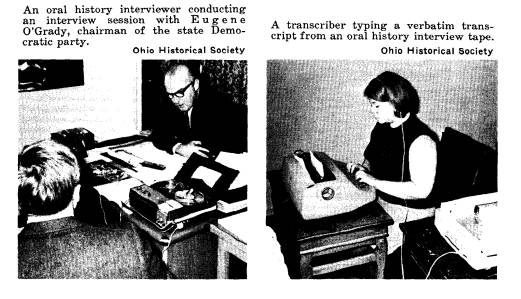Ohio History Journal
ESSAY AND COMMENT
49
The True Profile of the Harding
administration will emerge only as the
new historiography is joined with a
modification of the old.
DAVID H. JENNINGS,
Professor of History,
Ohio Wesleyan University
ESSAY AND COMMENT
Oral History in Ohio
During the past half century as the
telephone and computer are replacing
the personal letter and the telegraph, a
new era in historical research is
emerging. No longer does the detailed
letter serve as the major source of
expression, for the dominant mode of
communication in the atomic-space
age is personal conversation. Leaders in
many stations of American life can
manage their roles quite adequately
without committing much of their ac-
tion or thinking to the cold permanency
of ink and paper. Usually only
their conclusions settle into the
printed pages of newspapers, magazines, re-
ports, and form letters.
How does the American historian of the
recent period seek to penetrate
behind the often superficial written
records to probe the cycle of background
events and the obscured motivations of
the participants? One technique now
widely used by historians is called oral
history. Defined simply, oral history
consists of tape recorded interviews
with persons (respondents) by a trained
historical researcher (interviewer) for
the purpose of documenting opinions
and events not readily available in
written records. The tapes are then
transcribed into typed memoirs that may
be used immediately or in the fu-
ture by qualified researchers.
The first oral history program in the
United States was begun at Colum-
bia University by professor Allan Nevins
in 1948. In the two decades since
that date, about thirty professionally
staffed programs have been established.
The majority of the larger programs are
at major graduate universities on
the east and west coasts and at the six
presidential libraries, while there are
smaller programs at historical
societies, company archives, and special li-
braries. Usually these have focused on
subjects that relate directly to the in-
terests of the sponsoring institution.
Examples of some of the well estab-
lished oral history programs plus a
sample of a few of their many completed
interview projects are as follows:
University of California, Los Angeles (his-
tory of motion pictures and California
water problems); Kennedy Presiden-
tial Library (life of John F. Kennedy);
National Library of Medicine
(American medicine) ; Princeton
University (career of John Foster Dulles);
